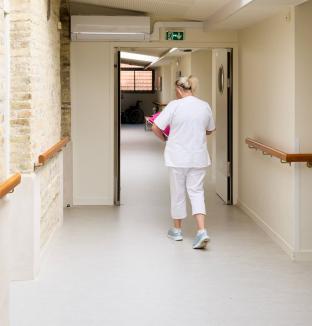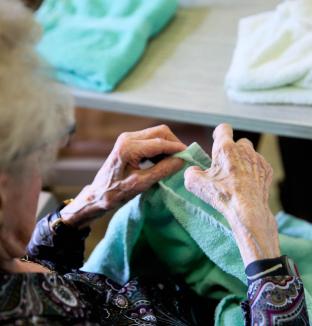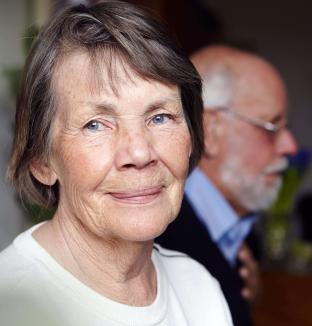Alzheimer's: a comprehensive approach to prevention, detection and support
Supporting people with Alzheimer's and related diseases is one of the major challenges facing our societies, where people are living longer and longer. To prevent, detect and support patients at every stage of the disease, the Group is developing a holistic approach based on 2 pillars: health and well-being.
A continuum of care for Alzheimer's patients
Identifying the first signs of the disease and providing support as early as possible is essential to optimize patient care. emeis is part of a comprehensive approach, from identifying the disease at home to alleviating symptoms in advanced patients. This approach is based on the physiopathology of these diseases. This approach takes into account both the lesions and co-injuries caused by the disease in the brain, and the co-morbidities not directly linked to the disease, but which have an influence on cognitive disorders. The Group's care approach focuses on health (medical, nursing, medicinal and non-medicinal aspects) and well-being or quality of life.
Care begins with the diagnosis. In Western countries, only 60% of diagnoses are made early enough. The Group, whose mission is to care for the most vulnerable, has a duty to help improve this statistic. How can we do this? On the one hand, through the auxiliaries who provide care in the homes of our beneficiaries, and on the other hand, through Memory Consultations and Day Hospitals in our facilities. The Group is also involved in the WHO's European ICOPE program, which aims to better detect frailty in the home, and thus improve the care provided to the elderly at the right time.
The “pathway” approach - home, then consultation or day hospital, then retirement home - enables a continuum of care that is intended to be gradual and gentle for the patient. This continuum also applies to prevention before the onset of the disease, with detection protocols, but also when the disease has already been declared. Once the disease has been diagnosed, the Group works to slow its deterioration. When the disease is advanced, protocols are in place to prevent associated behavioral problems or their worsening. All the teams involved in the care of this disease are convinced that there is always a way of preventing symptoms that can impair quality of life, even in advanced stages.

Understanding the whole Alzheimer patient for better care
Once the disease has been diagnosed, the care protocol is global and takes into account :
- Life history: the patient has a history, a past. We need to be aware of these so that they can guide the development and implementation of the personalized project.
- The patient's social project: based on the patient's life history, we need to draw up a project for him or her. What might it be? How can he or she remain a player in his or her own life for a while, or for longer? This project is broken down into specific actions. Interdisciplinary teams will work on memory therapy, which involves, for example, creating an environment reminiscent of the patient's former occupation or living environment... a setting that helps to establish familiar landmarks. We can also give patients a social role in the facility, depending on their level of autonomy. Obviously, this type of project is aimed more at moderate stages of the disease. For more advanced stages, we focus on well-being and quality of life.
- His well-being: to ensure the patient's well-being, whatever the stage of the disease. Animal mediation, touch communication through body massage, and psychomotor therapy are particularly effective. We can also rely on non-verbal means such as music, reading and images. Travel therapy, for mild disorders and patients who still have a certain degree of autonomy, is a way of promoting well-being. Teams suggest that patients move to another Group facility, or even spend time in another country, still in a Group facility with the same level of supervision and care protocols, for example. For more advanced disorders, some facilities have tested the virtual train. This reconstructed carriage allows patients to sit back and enjoy the scenery they have chosen. The Group is carrying out this project in partnership with a start-up company and the University of Amiens.

A transformation to improve care for Alzheimer's patients
The Group has launched a “Zero residents without direct medical care” plan to ensure that all our residents have access to a doctor, despite the shortage of GPs in certain regions of France.
The Group has also deployed a “good treatment” charter in all its facilities. The charter sets out 10 basic principles, such as knocking on the door before entering, or introducing oneself and how to address the patient when entering the room. To enable caregivers to reinforce these principles and work under the right conditions, we are also transforming our organizations and developing training. For example, we have created an e-learning module to identify and understand Alzheimer's disease-related disorders (such as aggression and hallucinations) and learn how to deal with and soothe them.

